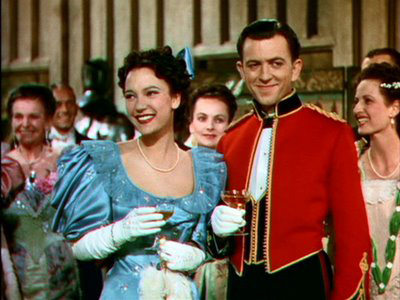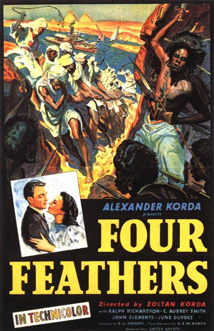
 |
|
|
|
The Four Feathers
A.E.W. Mason's 1902 novel The Four Feathers is a defining British adventure story about bravery, cowardice and honor. At least seven film adaptations have been released but this 1939 version is the best remembered. It was produced by Alexander Korda, England's most successful film mogul. The Hungarian born producer and director worked in several film capitols including Hollywood before putting down roots in London with 1933's celebrated The Private Life of Henry VIII. Korda's talented brothers and frequent collaborators Zoltán and Vincent make key creative contributions, as director and art director. At enormous expense, a Technicolor filming unit went on location to Africa to shoot epic battles between red-coated Europeans and native African armies. Original advertising promised scenes of desert combat with dervishes (a term inaccurately given to Arab fighters for the Mahdi) and fuzzy-wuzzies (Sudanese fighters of the Hadendoa tribe). After a prologue depicting the 1885 death of General "Chinese" Gordon in Khartoum, the story proper begins in London, ten years later. Lt. Harry Faversham (John Clements) has a start on a fine military career, and is the envy of his three friends Arthur Willoughby, Peter Burroughs and John Durrance (Jack Allan, Donald Gray & Ralph Richardson). John is disappointed when Harry becomes engaged to Ethne Burroughs, the most desirable young woman in London (June Duprez). But Harry only joined the army to please his father, and never thought he'd actually have to see action. When his regiment is assigned to the re-conquest of the Sudan, he abruptly resigns his commission. The act outrages all who know Harry, and casts a dark shadow over his engagement. His former comrades sever all ties by sending him three white feathers, a formal gesture symbolizing cowardice. Interpreting Ethne's hesitant attitude as the equivalent of a fourth feather, Harry decides to go secretly to Africa, with a wild plan to win back his reputation -- or die alone and un-mourned. National epics celebrating the colonial past are no longer in fashion, and the days when England could consider itself the center of a vast empire are now long gone. The Four Feathers comes directly from the patriotic tradition. Although the script by R.C. Sherriff, Lajos Biró and Arthur Wimperis points out the blindness of the martial code and makes mild fun of a pompous old General, several set assumptions are upheld: that British rule imposed order over chaos in foreign lands; that the heathen natives of the Earth were meant to be ruled by Europeans; and that there was no greater honor for an Englishman than to serve in the Crown's Armies of conquest and pacification. 
The film presents an intriguingly ambivalent attitude toward military life. Army traditions are exalted, yet the hero is a conscientious individualist unwilling to go to war. A childhood flashback shows young Harry Faversham to be traumatized by a harsh father and General Burroughs' stories of suicide charges and the summary execution of cowardly officers. Unwilling to face high risk in battle, Faversham is ostracized as a traitor to his class. But he proves both brave and resourceful when acting on his own. Sneaking away to Egypt, he has his skin dyed and his forehead branded in order to pass as a mute native. He slips quietly among the laborers serving his regiment's unit. Harry's plan is to win back his honor and return those damning white feathers. His true calling, it would seem, is to be an espionage agent in Her Majesty's Secret Service. What follows is a fine desert adventure. Harry helps the blinded John Durrance survive after a devastating attack by the fuzzy-wuzzies, without letting on who he really is. When imprisoned by the British, Harry still does not reveal his identity. He breaks into a prison to contact his other two former friends, and sparks a revolt at just the right time to support a British attack. With action scenes played for spectacle and excitement, the show builds in both suspense and character interest. Even Hollywood was impressed by the Korda's location shoot in far off Sudan. Taking a full Technicolor crew overseas in 1939 was no small undertaking, and the scorching desert was not an easy place to film. We see sailing craft cruise the Nile as native labor gangs tow a flotilla of troop boats upstream. We can almost feel the blazing sun that blinds Lt. Durrance, as he staggers delirious from heatstroke. The soldiers' red wool tunics look completely ill-suited for desert fighting. The large-scale battle scenes, with hundreds of barefoot warriors charging across the ragged desert, still impress audiences. When Korda remade the film in CinemaScope in 1955 as Storm Over the Nile, this same footage was reformatted for the wide screen. 
England in 1896 is represented with stately interiors for the Generals' homes, where old soldiers recount past glories and challenge the new generation to equal their exploits. Harry Faversham should be a rebel but instead follows his predetermined path as far as he can. His romance with the gorgeous Ethne is almost a military fairy tale. This might be the most famous film role of actor John Clements but the real standout in the cast is Ralph Richardson. He turns in a memorable performance as the competent officer who makes the mistake of losing his helmet in the desert heat. June Duprez's Ethne is a vision in her Technicolor close-ups, she's even more arresting in Korda's next film The Thief of Bagdad. The hearty, lovable C. Aubrey Smith was a prime exponent of the British "colony" in Hollywood. His proud General Burroughs a fine exponent of the spirit of the officer corps. His favorite activity is re-staging the battle of Balaclava on a table, using nuts and fruit to represent the combatants on the field. Burroughs is also the first to turn a cold shoulder to Harry Faversham. In the best adventure tradition, courage and fortitude bring about a victory and personal vindication. Harry reclaims not only his honor but the "right" to wed Ethne, the ultimate prize. Despite Harry's success, the military code has not been affected, as demonstrated by self-imposed fate doled out to the blinded John. The Four Feathers is the perfect film to initiate a discussion of codes of honor. Criterion's Blu-ray of The Four Feathers has been remastered from a 35mm internegative held by the British Film Institute. Color values and contrast are excellent. A few scenes show some red fringing around bright objects, indicating shrinkage in the original Technicolor filmstrips when the composite negative was struck. The effect is not distracting. The hearty restored soundtrack features Miklós Rózsa's impressive music score. Criterion's extras offer a fresh perspective on the film and the contribution of the Korda Brothers to British film history. Historian Charles Drazin provides an informative full-length commentary, and a new interview with David Korda, the son of Zoltán, offers an inside look at the intensely creative family. A Day at Denham is an interesting promotional film that shows scenes in production at Denham Studio. The prison fortress attack sequence seamlessly intercuts footage filmed in England with location work in the Sudan, matching action with great precision. Viewers familiar with Korda's epic Things to Come will recognize some of that film's music cues recycled as background underscore. An original trailer is included as well, and a folding enclosure contains an essay by critic Michael Sragow.
On a scale of Excellent, Good, Fair, and Poor,
The Four Feathers Blu-ray rates:
Reviews on the Savant main site have additional credits information and are often updated and annotated with reader input and graphics. Also, don't forget the 2011 Savant Wish List. T'was Ever Thus.
Review Staff | About DVD Talk | Newsletter Subscribe | Join DVD Talk Forum |
| ||||||||||||||||||